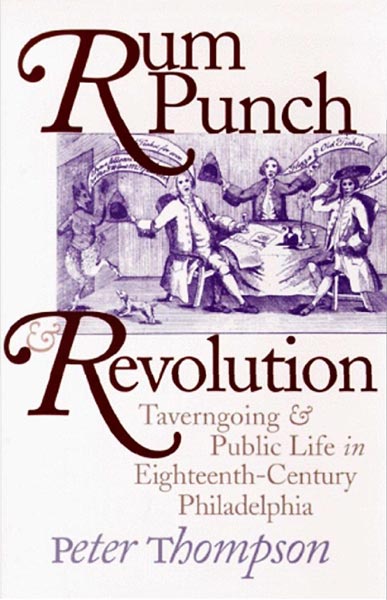 Rum Punch & Revolution Rum Punch & Revolution
Taverngoing & Public Life in Eighteenth Century Philadelphia
Peter Thompson
Narrated by Gary Roelofs
Available from Audible
Book published by University of Pennsylvania Press
There were, Peter Thompson notes, some one hundred and fifty synonyms for inebriation in common use in colonial Philadelphia and, on the eve of the Revolution, just as many licensed drinking establishments. Clearly, eighteenth-century Philadelphians were drawn to the tavern. In addition to the obvious lure of the liquor, taverns offered overnight accommodations, meals, and stabling for visitors. They also served as places to gossip, gamble, find work, make trades, and gather news.
In Rum Punch and Revolution, Thompson shows how the public houses provided a setting in which Philadelphians from all walks of life revealed their characters and ideas as nowhere else. He takes the reader into the cramped confines of the colonial bar room, describing the friendships, misunderstandings and conflicts which were generated among the city's drinkers and investigates the profitability of running a tavern in a city which, until independence, set maximum prices on the cost of drinks and services in its public houses.
Taverngoing, Thompson writes, fostered a sense of citizenship that influenced political debate in colonial Philadelphia and became an issue in the city's revolution. Opinionated and profoundly undeferential, taverngoers did more than drink; they forced their political leaders to consider whether and how public opinion could be represented in the counsels of a newly independent nation.
Peter Thompson is Sydney Mayer Lecturer in Early American History at the University of Oxford and a Fellow of St. Cross College.
REVIEWS:
“A gold mine.... The author creates a fascinating story, rich in tidbits and anecdotes.”
—Choice “A marvelous book about an important, interesting, and diverting subject.”
—American Historical Review “Thompson is surely right about the long term change: the class stratification of tavern culture did cause some people to stop hearing voices with contrary opinions.”
—William and Mary Quarterly “An important, provocative book.”
—Labour/Le Travail
|

